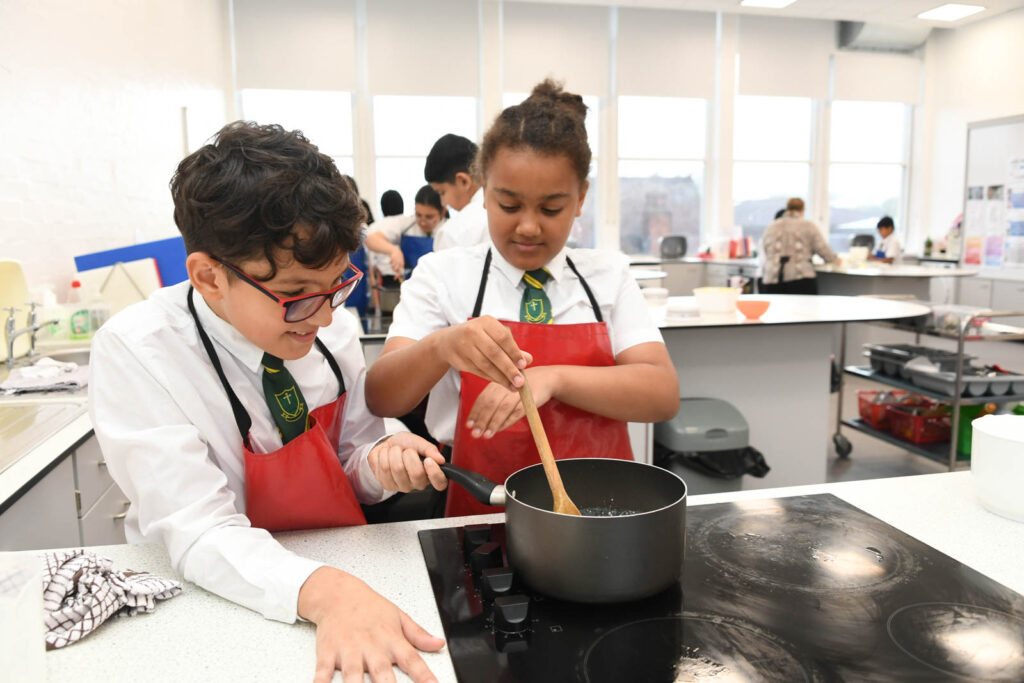The Year Group saint for Year 7 is St John Paul II
Year 7 identity is ‘My talents’
John Paul II was the first non-Italian pope in 455 years. He travelled abroad extensively in an effort to promote greater understanding between countries and religions, and he campaigned against political oppression, violence, and materialism.
Pope John Paul II was head of the Catholic Church and sovereign of the Vatican City State from 1978 until his death in 2005. Pope Saint. John Paul II.

Year 7 Assessment
The transition to secondary school is a significant milestone for students, not only because of the new environment and subjects, but also because of the way their academic progress is assessed. In Year 7, assessments serve as both a foundation for future learning and an early indicator of a student’s strengths and areas for development. A comprehensive system of baseline testing, ongoing data collection, and formative assessments is put in place to track progress and ensure that students are well-prepared for the academic challenges ahead, particularly as they approach Key Stage 4 (KS4).
When students join the school in Year 7, one of the first assessments they are exposed to is the Cognitive Abilities Test (CATs). These tests provide valuable insight into a student’s innate cognitive abilities, such as verbal reasoning, quantitative reasoning, and non-verbal reasoning. By identifying a student’s strengths and weaknesses across these areas, we can establish a baseline for their academic potential.
In addition to the CATs data obtained, we take into careful consideration students KS2 SATS scores, which are typically taken at the end of primary school. The National Standardised Assessment Tests provide us with a clear understanding of where students are academically when they join secondary school. By combining the data from both CATs and SATs, teachers can make informed decisions about each student’s learning journey and set an appropriate minimum expected grade (MEG) for the end of Year 11.
In Year 7, students are assessed twice a year through data collection points, typically in the spring and summer terms. These assessments are designed to track progress and identify any gaps in learning early, so interventions can be put in place.
Teachers use a range of assessment methods, including written tests, in-class activities, and project-based work, to gauge understanding and skills development. The data collected at these points is then used to monitor how students are progressing towards their expected grades. Importantly, these assessments aren’t just about numbers; they are also a tool for teachers to gauge student engagement and confidence in each subject.
At each data collection point, students’ attitude to learning is also carefully considered. This is not just about academic performance but also about how engaged and motivated a student is in the classroom. Factors such as effort, participation, punctuality, and the ability to work independently are all taken into account.
After each data collection point, parents will receive an overview of their child’s progress. An acronym will be shared with parents as follows:
Exceeding
Exceeding minimum expected grade
On track
Achieving minimum expected grade
Working towards
Working below minimum expected grade
Requires improvement
Working significantly below minimum expected grade
Research consistently shows that a positive attitude to learning is one of the strongest predictors of long-term academic success. By closely monitoring and supporting students’ engagement, we can help foster a growth mindset, where students are encouraged to take ownership of their learning and are more likely to persist in the face of challenges.
As students approach the end of Year 7, they are introduced to the concept of mock exams—an essential practice for preparing for the formal GCSE assessments they will face in Key Stage 4. The mock exams in Year 7 are typically focused on one or two subjects, providing students with a chance to experience what it will be like to sit formal exams in a controlled setting.
The mock exams are designed not only to assess students’ knowledge and skills but also to help them build essential exam techniques, such as time management, revising effectively, and handling exam stress. The experience is invaluable in developing resilience and familiarising students with the expectations of formal assessments, ensuring that when the time comes for their GCSEs, they are well-prepared for the process.
Year 7 marks the beginning of a four-year academic journey that culminates in the GCSE exams at the end of Year 11. Throughout Year 7 and beyond, the assessments are not just about measuring where students are right now, but also about preparing them for the rigours of Key Stage 4. By building on the process of mock exams each year, students gradually become more familiar with the expectations of formal testing and develop the skills needed to succeed.
As students move through Year 8, Year 9, and into their GCSE courses in Year 10, they will continue to engage with increasingly sophisticated forms of assessment. The aim is to ensure that, by the time they reach Key Stage 4, they are not only academically prepared but also confident and resilient in the face of challenging exams.
Year 7 Parent Evenings:
Year 7 Settling-In Evening takes place during the first half term of the school year, typically in October. It provides an opportunity for parents to meet with tutors and staff, ask questions, and discuss how their child is settling into life at secondary school. It is an important moment for parents to hear about how their child has settled into Holy Trinity, share any concerns, and receive information on how best to support their child’s transition.
A formal Parents’ Evening will be held in the summer term. During this event, parents will have the chance to meet with subject teachers and discuss their child’s academic progress, achievements, and areas for development. This evening will focus more on the curriculum and how your child is progressing in individual subjects.

